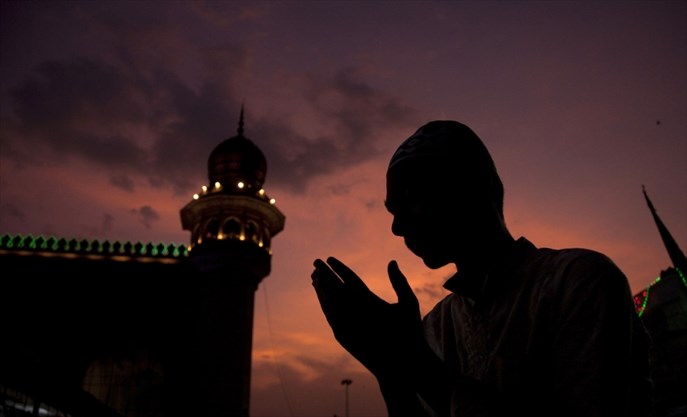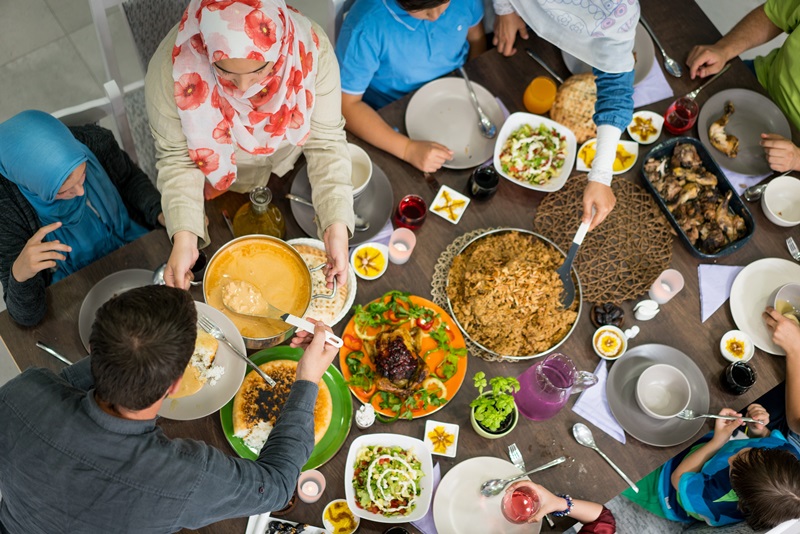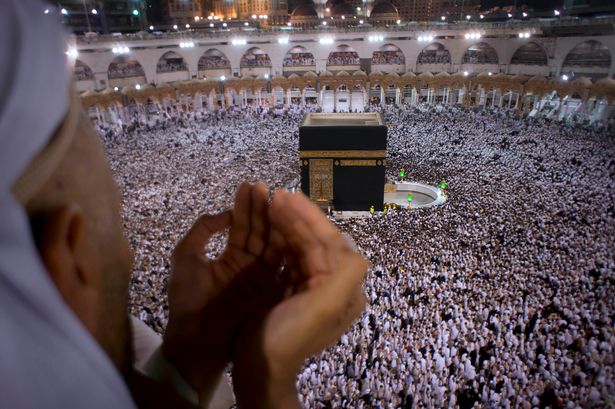
It’s starting this year on May 5 or 6, depending on where you are in the world, and in Malaysia, it’s impossible to be unaware of it. But what exactly is Ramadan, how does it work, and for non-Muslims, how can you best understand it and ensure you don’t accidentally offend your Muslim friend or neighbour?
For the uninitiated – or those who may be new to Malaysia – Ramadan can be a bit of a mystery. But don’t worry, we’re here to ensure all your Ramadan questions are answered!
1. What is Ramadan all about anyway?
If Christmas is the “most wonderful time of the year” for Christians, it’s not inaccurate to say that Ramadan is the equivalent in Islam, in that it’s a religious holiday period where everyone celebrates, gets together with friends and family for good meals, exchanges gifts, and enjoys the festive season.

Ramadan is a sacred month for Muslims, who believe that it was during this month (the ninth month of the Islamic calendar) that God revealed the initial passages of the Quran to the Prophet Mohammed, beginning on a night called Laylat al-Qadr in Arabic. During this holy month, Muslims fast every day from sunrise to sunset. Strictly speaking, this isn’t a particularly huge challenge here in the tropics, but requires rather more discipline in the northern latitudes where, at least when Ramadan falls during the summer months, the period of daylight is considerably longer! The fasting is supposed to be a time of spiritual reflection, increased charity, extra prayer, and a focus on one’s relationship with God.
It’s safe to say, however, that for some, fasting is done more out of a sense of habit or social pressure than a pursuit arising from true spiritual reckoning and self-reflection, much in the same way Christmas has become more of a festive (and commercial) celebration throughout many societies, rather than a sombre reflection of the birth of Christ.
2. What are the fasting requirements?
Many who are unaware of the realities of fasting during Ramadan may assume it simply involves abstaining from food. However, that’s just one part of it. The practice of fasting actually has several functions, so it necessarily involves more than just not eating. One idea behind the fast is to remind people of their human frailty and thus, their dependence upon God for sustenance for their lives. It also shows them what it’s like to feel hunger, so that a sense of compassion for those who are poor and needy is awakened – along with a sense of duty to help such people. Finally, the period of fasting is meant to encourage people to focus on their relationship with God, rather than spending that time pondering their next meal (or enjoying the current one).
Beyond not eating, however, Muslims also cannot have anything to drink during the fasting period. They should also not smoke, chew gum, take medications, or engage in any sexual activity – again, from sunrise to sunset. Doing any of these things basically invalidates the entire day of fasting, and dutiful Muslims will have to “make up” for that lost day by fasting later in the year, or by providing a meal to a person in need.
Additionally, Muslims are also encouraged to refrain from negative thoughts, along with emotions like jealousy and anger. Cursing, complaining, and gossiping are also meant to be curbed during Ramadan.
3. How does a normal day during Ramadan go?
Muslims will wake up well before sunrise to pray and have their first meal of the day. This is called the sahur (or suhur), a pre-dawn meal which is ideally high in protein to sustain them during the fasting period. Plenty of water will also be consumed at this time. Since this meal is eaten quite early – usually between 4 to 5am – many people will go back to sleep afterward until it’s time to get up and start their day.
In theory, nothing during the fasting day is supposed to change (apart from the fasting itself), but here in Malaysia, many businesses will slow down during the month, and since Muslims effectively skip their lunch hour, most will be allowed to go back home early, resulting in traffic jams occurring quite a bit earlier than usual.
Couple that with the crush of people going to those excellent traditional Ramadan markets and bazaars to shop for food before breaking their fast, along with people going to restaurants to eat as soon as the sun sets, and you can see why afternoon traffic jams are a major fixture in and around Kuala Lumpur during Ramadan. The local wisdom during the fasting month is that you either go home before 5pm or you wait until 8pm. Trying to get from point A to point B at any time between those hours is just asking for trouble.

The Malay phrase for breaking fast is buka puasa, so you’ll see this term a lot during Ramadan! When it’s time for the iftar, the name of the meal that breaks the fast following the sunset call to prayer, many Muslims will have a light snack, followed by the evening prayers, then have a heavy dinner later. Others will eat a huge meal right away. (If you’re in a restaurant, you may see several Muslim diners with a full meal sitting in front of them, untouched, as they wait for the precisely appointed time to break their fast!) Some will go to a mosque to perform a special prayer that is only recited during Ramadan.
There will oftentimes be another meal taken later in the evening, and friends and families will get together to share food, including special Ramadan treats, with each other. Then, following the evening prayers – a special version of these prayers called tarawih is in fact recited only during this month – it’s time for bed, and the whole process is repeated again the next day. It may sound tedious, and the fasting may sound difficult, but in fact, for many Muslims, Ramadan is a joyful period and a festive season they greatly look forward to celebrating.
4. Do Muslims typically lose weight during the fasting month?
Though you might think the daily fasting exercise would result in weight loss, for many Muslims, Ramadan is pretty well-known as a time for gaining weight! A significant pre-dawn meal, followed by 12 to 15 hours of fasting (and usually some pretty serious lethargy), followed then by a large evening meal can wreak havoc on a person’s metabolism.
Weight gain during the fasting month is not necessarily a given, but it’s also not at all uncommon. For most Muslims, the weight gain or loss tends to be relatively small, and following Ramadan, their weight will typically return to its pre-fasting number within a couple of weeks or so.
5. Why does Ramadan’s date change from year to year?
Like many societies and religions, Islam traditionally follows a lunar calendar. Since the phases of the moon – one cycle takes 29.5 days – will never add up to a precise 365 days, there’s an offset each year. Twelve lunar cycles comprise about 354 days (this can vary a bit over time), meaning there’s a difference compared to the standard yearly calendar. Accordingly, the start of Ramadan shifts back approximately 11 days every year.
Unsurprisingly, this lack of annual consistency can have a real impact on the rigours of fasting for Muslims living in northern or southern latitudes. (Malaysia’s tropical-dwelling Muslims are happily not impacted by this change!) When Ramadan falls in winter months in the north, fasting is easier as the daylight hours are shorter and the weather is cooler, so not as much water is lost through sweating.
Conversely, however, when Ramadan occurs in the summer months, it can be incredibly challenging. Temperatures in the Middle East, for example, routinely touch 50°C and daylight lasts considerably longer. Naturally, the further north you go, the longer the days are, with daylight lasting 18-20 hours in far northern countries. In such places, or in those where the sun actually doesn’t set at all during the summer months, Islamic authorities have said that Muslims living there can observe the fasting times of either the nearest Muslim country or those of Mecca in Saudi Arabia.
The official beginning time of Ramadan is also fraught each year with confusion and arguing among the Muslims of the world. Some believe it should follow the guidelines from sixth-century times, when Mohammed decreed that fasting should begin when you could first see the thin sliver of the crescent moon in the sky following the new moon phase (leading to different start times in different places as various people claimed to see the moon, and others questioning them).

Others feel that the more precise astronomical knowledge of today should be used to determine the beginning of Ramadan, as we no longer need to wait until someone can claim to have spotted the thinnest sliver of moon – we can now predictably calculate exactly when that will occur. Still others argue that Saudi Arabia should be the final arbiter of such matters, with the entire world following their decrees, while of course rival Islamic countries don’t agree with that at all! All of this “moon-sighting fighting” is actually an annual “ritual” of sorts in the Muslim world, with many taking it all in good-natured stride and having fun with it. (A number of memes, predictably, have even been created!)
6. So how can non-Muslims be mindful of their Muslim friends during the fasting month?
In some Muslim countries – that is to say, the more hardcore ones – it’s actually a crime to eat or drink in public during the daylight hours of Ramadan, whether or not you’re Muslim! This is not strictly the case in Malaysia, as under the Shariah Criminal Offences Act of 1997, it is only Muslims who are not permitted to eat, drink, or smoke in public during the fasting hours. So while non-Muslims are neither required nor expected to radically change their behaviour to accommodate the fasting done by Muslims, they can still show respect for the traditions and practices of their friends, co-workers, and neighbours by keeping a few things in mind.
The obvious one is not to sloppily devour that big, juicy cheeseburger at your desk for lunch, while your hungry Muslim colleague sits nearby, drooling and craving a big bite. Less obvious could be curbing your tendency to offer snacks or sweets to your Muslim friends. You may do this quite often – we have a staff member here who considers the day wasted if he doesn’t go around offering chocolates to everyone – but it should be avoided during Ramadan.
Your Muslim friends won’t really expect you to fast along with them in solidarity, but for non-Muslims, it can still be interesting to do so, at least for a few days. If nothing else, this can illuminate the experience and lead to a greater cross-cultural understanding, which is never a bad thing.
Feel free to also learn the local sayings and greetings and express those to your Muslim friends. The terms can be a little different from place to place, with local versions and Arabic versions existing side by side, and there can also be both formal and colloquial versions, too. (For example, Muslims in Malaysia can have different terms for various religious days than their counterparts in Indonesia.)
During the fasting month itself, a common phrase in Malaysia is Selamat Berpuasa. (Eid Mubarak is the Arabic phrase for “blessed holiday” and you may hear this, too, or perhaps Ramadan Mubarak during the fasting month) On the holiday celebrating the end of Ramadan, known as Eid ul-Fitr (and the spelling may vary), “Selamat Hari Raya Aidilfitri!” is a greeting often exchanged.

Selamat Bulan Puasa (“happy fasting month”) to all those who celebrate it, and for those who’d like to learn more about Ramadan and Hari Raya in Malaysia, and all the wonderful things that accompany the festive season, just visit https://itc.gov.my/tourists/discover-the-muslim-friendly-malaysia/ramadan-eid-ul-fitr-in-malaysia/.
For a more personal account of what it means to fast in Malaysia as a Muslim, read more at https://www.thestar.com.my/opinion/columnists/ikim-views/2018/05/29/ramadan-a-month-of-self-reflection-more-than-just-a-ritual-fasting-requires-muslims-to-avoid-evil-a/.
"ExpatGo welcomes and encourages comments, input, and divergent opinions. However, we kindly request that you use suitable language in your comments, and refrain from any sort of personal attack, hate speech, or disparaging rhetoric. Comments not in line with this are subject to removal from the site. "




















